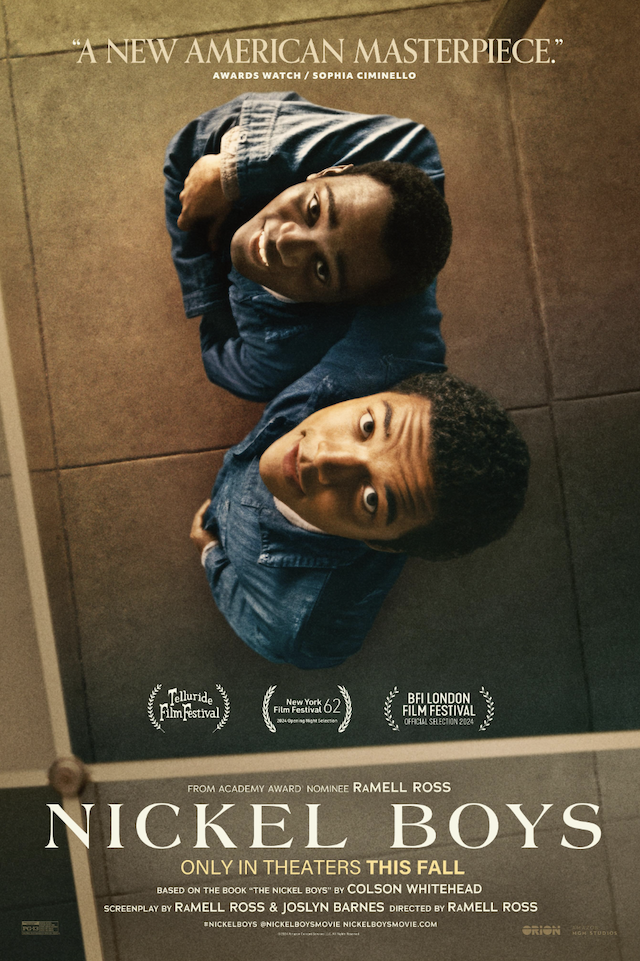
It’s in the glimpses tragic and poetry happen. In the beginning of RaMell Ross’s extraordinary first narrative feature Nicke Boys, a realization of the 2019 Pulitzer Prize-winning novel by Colson Whitehead, which opens the New York Film Festival, the filmmaker creates a world unlike any other. A child’s hand holds a leaf in the grass, a woman picks up pieces of glass from a floor, a bruised knee in a bathtub, Martin Luther King states “How long, not long” in a TV box in the store window. Immediately you know, this is exceptional.
Not long after we realize we see what a boy sees. Literally. Shot in first-person perspective we follow Elwood (Ethan Herisse) and what unfolds through his eyes. He is an African American teenage boy in Tallahassee, Florida, living with his grandmother, Hattie (played by Aunjanue Ellis-Taylor who deserves another Oscar nomination).
Unlucky to be living in the height of Jim Crow 60s-era, Elwood is a bright, quiet and engaged kid finding support in Dr. Martin Luther King’s words and attending community college. One incident changed his life. Innocently hitching a ride in a well-dressed black man’s stolen car, that is pulled over by the police, Elwood is unjustly sentenced to the notorious real-life reform school, the Nickel Academy. We see no arrests or trials, but a clip from Stanley Kramer’s The Defiant Ones (1958) in which Sidney Poitier and Tony Curtis sit in a police van, is shown. The abyss begins.
At the school he meets the more rebellious Turner (Brandon Wilson) who becomes his best friend. Gradually we are Turner’s eyes, and see what Elwood looks like. And vice versa. At Nickel Academy, white boys play football, blacks are not allowed. It’s a place of racism, abuse and dehumanization – black boys are beaten to death and officially written off as runaways. The truth has literally been buried in the ground and despite reports of the cruelty, the real school ran from 1910 to 2011.

Colson Whitehead’s novel (he also wrote The Underground Railroad filmed for television by Barry Jenkins 2021) mirrors the lives of the actual young men who attended the real-life Arthur G. Dozier School for Boys in Marianne, Florida and their reports of the abuse and horror. In the film a boy says: “there are Nickels all over, this is just one place”.
Instead of showing the actual violence, RaMell Ross refuses to display the character’s pain. His approach is non-exploitative with non-explosive feelings. He shows what is left unseen while shining a light on what is happening, accompanied by Scott Alario’s and Alex Somers’ haunting score. Ross claims that when people go through traumatic things, they’re not always looking in the eye of evil.
You look where you look, and the impressions become memories in your life. His approach creates a dreamy and horrific subjectivity. With his first-person perspective, perhaps mostly successful before in Gaspar Noé’s Enter the Void (2009), he asks questions about where we actually look, what detail do we pay attention to, how do you not frame someone. His distinctive vision has similarity to his Oscar-nominated documentary Hale County This Morning, This Evening (2018), where he captured the daily life for black residents in the south in a racist history.
In Nickel Boys, his visuals continue into a narrative. The cinematographer Jomo Fray (All Dirt Roads Taste of Salt, 2023) captures something that cinema rarely sees. When we enter a time closer to today, showing the adulthood for men who struggle to live with the trauma, the camera is now placed behind someone’s head. Ross’s originality is bold and artful. In anyone else’s hands it could easily have fallen into pieces.
The violence is present, without being shown. The pain and the hope are in glimpses and details. Lyrical details, like a brochure slowly sliding down a wall too heavy for a magnet or a collar on a boy’s worn uniform shirt, Ross creates an unforgettable and poetic atmosphere without losing track of the actual story. We know what’s going on – it’s subtle and emotional, it’s alive. As much as Steve McQueen’s 12 Years a Slave (2013) and Jenkins’ Moonlight (2016) made a mark, Nickel Boys is a film to be talked about for a long, long time.
Grade: A
If you like the review, share your thoughts below!
Check out more of Niclas’ articles.
Here’s the trailer of the film.

